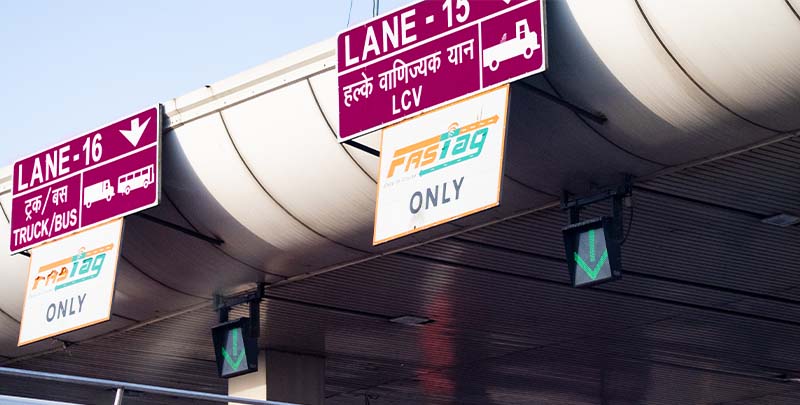FASTag is a straightforward, cashless solution for toll payments in India. It is mandatory for all vehicles, offering a seamless and convenient way to pay without any hassle.
FASTag meaning
FASTag is a radio-frequency identification (RFID)-based system for cashless toll payments. It is affixed to your vehicle’s windscreen and automatically deducts toll charges from a linked prepaid account as you drive through FASTag lanes. This eliminates the need to stop and wait in long queues. It makes toll payments faster, reduces congestion and supports a seamless cashless experience.
How does FASTag work?
- Purchase and activation: Buy a FASTag from an issuing bank or online platforms like Axis Bank. Follow the activation instructions provided.
- Attach to windshield: Place the FASTag on your vehicle’s windscreen, usually at the top-centre.
- Link with an account: Connect the tag to your prepaid account through the bank's portal or online service. Provide vehicle and account details for linking.
- Recharge: Ensure sufficient balance by recharging your account via net banking, Debit / Credit Card or UPI.
- Automatic toll payment: As you pass through a toll plaza, an RFID reader scans the FASTag and deducts the toll from your account automatically.
- Notifications: Receive SMS or app alerts for each transaction, as well as account balance updates.
Benefits of using FASTag
- Timesaving: Skip long queues with automatic toll deduction.
- Cashless: No need for cash, all payments are electronic.
- SMS alerts: Get instant updates for every deduction, recharge, and low balance.
- Fuel efficiency: Fewer stops reduce idling, saving fuel.
- Nationwide use: Accepted at 600+ toll plazas across highways.
- Eco-friendly: Less idling means lower emissions and fuel consumption.
- Versatile use: Accepted at select parking lots and fuel stations, enhancing its utility.
Why do you need FASTag?
FASTag is now mandatory for all vehicles passing through toll booths on national and state highways. The Ministry of Road Transport and Highways requires all new vehicles to have FASTag installed. Additionally, FASTag is integrated with various payment platforms like digital wallets, cards, and UPI, making it easy to recharge and manage. This ensures smoother travel and eliminates the need for cash transactions at tolls.
Conclusion
FASTag is a revolutionary system that simplifies toll payments in India, making road travel quicker, more efficient, and entirely cashless. By adopting FASTag, you save time, money, and energy, while complying with government regulations. Given its growing utility across highways, parking hubs and fuel stations, FASTag is set to be an integral part of vehicle management in India.
You can easily apply for and manage your FASTag through the Axis Mobile app, which provides seamless recharges, balance tracking and transaction history, making your toll payments effortless and hassle-free.
Also Read: FASTag balance check: 4 simple ways to check FASTag balance
FAQs
What is FASTag in car use?
FASTag is an RFID tag placed on your car’s windscreen, enabling automatic toll payments without cash or stopping at toll booths.
What is FASTag based on?
FASTag uses RFID technology to communicate with toll plaza sensors, deducting tolls directly from your linked account.
Can I drive without FASTag?
No, as per the Ministry of Road Transport and Highways, FASTag is mandatory for all vehicles on national highways from February 2021. Driving without it may lead to penalties or double toll charges.
What is the validity of FASTag?
FASTag is valid for 5 years. Just ensure your account is regularly recharged to cover toll payments.
Disclaimer: This article is for information purpose only. The views expressed in this article are personal and do not necessarily constitute the views of Axis Bank Ltd. and its employees. Axis Bank Ltd. and/or the author shall not be responsible for any direct / indirect loss or liability incurred by the reader for taking any financial decisions based on the contents and information. Please consult your financial advisor before making any financial decision.







